The 2014 Draft began a string of very successful drafts for general manager Doug Armstrong and his St. Louis Blues. Though 2013 had been one of his worst efforts, the 2014 Draft provided the Blues with many NHL-caliber players and some prospects who are still highly valued in their system. (To review the 2013 Draft or others in our series, look below).
- 2010: Two stars arrive
- 2011: Second round success
- 2012: A diamond in the rough
- 2013: A year to forget
- 2014: Success after success
- 2015: Dunn and done
- 2016: A lot of promise
- 2017: Stanley Cup foundation
With the 2014 Draft, the Blues’ current roster found a number of significant depth pieces and strong prospects. Without further ado, let’s start at the top.
First Round
Robby Fabbri, F (Guelph Storm, OHL), #21
Unlike the previous year, the Blues entered 2014 with a first-round pick in hand. With it, they selected Robby Fabbri, a forward who had collected 87 points in 58 games with the Guelph Storm in his draft season. Had that not been enough, he solidified his value by taking home the OHL Playoff MVP honors for that season.
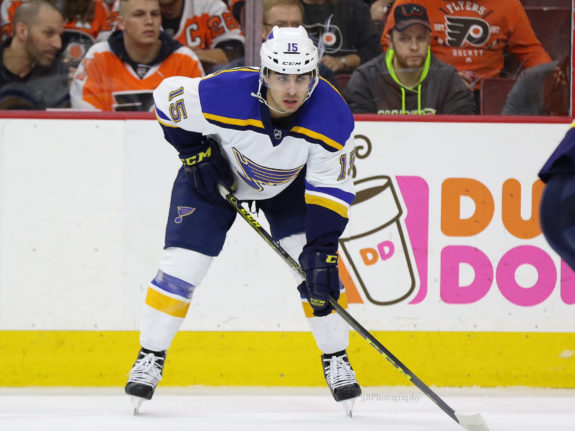
Analysts at the time were surprised that Fabbri fell as far as he had, and the Blues believed they had gotten a steal. Drafting Fabbri likely took the sting off for the Blues, who were hoping to draft Nick Schmaltz, having drafted his brother Jordan two years before. Knowing this, the Chicago Blackhawks, St. Louis’ arch-rival, traded up to the pick above them to take him instead.
Whatever regret the Blues may have had about missing out on Schmaltz quickly abated after Fabbri arrived in the NHL. He debuted in the 2015-16 season and scored 37 points in 72 games before having a white hot playoff run with 15 points in 20 postseason games. Fabbri looked to be a future star, and he began the following season with 29 points in 51 games.
But then, injury struck Fabbri in a big way. He left the game on Feb. 4, 2017 after his knee bent awkwardly in a play along the boards. He was helped off the ice and it quickly became public that he’d suffered a torn ACL. It was the end of his season, but the Blues hoped he’d be back in the fold by the beginning of the next season.
Rehab went well for Fabbri and he was ready for training camp. But it was there that he suffered a second consecutive injury to his ACL and was forced to miss another entire season. Though he is healthy now, recovering from consecutive knee injuries was always going to be an uphill battle, and he has struggled to find his game since his return.
With that said, Fabbri is still very young. We can’t know yet whether he will ever recover his peak form, and it’s certainly possible with such serious injuries that he might not. But effort has never been a problem with him, and if his body is capable, he will certainly get there eventually.
Missed Opportunity: David Pastrnak, #26
While no one can fault the Blues for selecting Fabbri where they did, particularly with the success he found before his injuries, they did miss on a player who has become one of the league’s elite scoring threats. David Pastrnak was selected by the Boston Bruins with the 26th pick, and since his draft, he has already collected over 250 NHL points. Fabbri was by no means a bust or a disappointment, but anytime you narrowly miss on a young superstar, it’s worth mentioning.
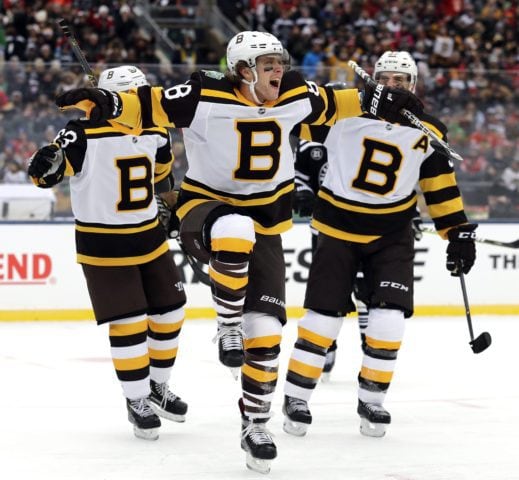
Middle Rounds (2-4)
Ivan Barbashev, F (Moncton Wildcats, QMJHL), #33
The Blues added this selection via trade, when they surrendered David Perron to the Edmonton Oilers in exchange for this pick and Magnus Paajarvi. With it, they selected Ivan Barbashev, a Russian playing with the Moncton Wildcats of the QMJHL. Barbashev had 68 points in 48 games in his draft season, and added 10 more points in six playoff games. He was believed to be a two-way forward who brought aspects of both the Russian and North American game to the ice.
[Barbashev has] blended the best of both worlds – Russian skill with North American grit.
That projection turned out to be fairly accurate. The Russian quickly became a fan favorite in St. Louis, debuting in the 2016-17 season, collecting 12 points in 30 games. Though he had something of a sophomore slump with some unpredictable play, his third season has been a decided improvement. He’s made himself a fixture in the Blues’ bottom-six, and will likely stay there for the foreseeable future.
Missed Opportunity: None
Though Barbashev has not yet and perhaps will never develop the high-end skill some believed he had entering the draft, there’s nothing wrong with getting a steady bottom-six forward in the second round. Top goaltending prospect Thatcher Demko was selected three picks after him, but it’s too early and Barbashev has been too successful to call that a miss.
Maxim Letunov, C (Youngstown Phantoms, USHL), #52
With their own second-round pick, the Blues selected Maxim Letunov, another Russian forward, this one playing in the USHL. He had 43 points in 60 games in his draft season, and had an even better season the one after. He went on to play in college at the University of Connecticut, where he performed well, but he’s not yet gotten a chance to play in the NHL.
The Blues traded Letunov to the Arizona Coyotes when they acquired Zbynek Michalek at the deadline in 2015, less than a year after he was drafted. Letunov is now in the San Jose Sharks organization. At just 23, there’s still hope for him to make the big league.
Missed Opportunity: Brandon Montour, #55; Ryan Donato, #56
The Blues missed on a couple of NHL contributors when they selected Letunov, both of whom were traded at the 2019 Deadline. Brandon Montour, originally drafted by the Anaheim Ducks three picks after Letunov, has developed into a top-four, puck-moving right-handed defenseman, a hot commodity in today’s NHL.
Ryan Donato, who was selected by the Bruins one pick after Montour, was an Olympic hero in the 2018 Games, and has begun to find his stride in the NHL. Obviously, as both have already contributed at the NHL level, both would have been an improvement on Letunov, who has not yet made it that far.
Jake Walman, D (Toronto Jr. Canadiens, OJHL), #82
With their third-round pick, the Blues selected Jake Walman, an offensive-minded defenseman out of the Ontario Junior Hockey League (OJHL). Walman had collected 33 points in 43 games with the Toronto Jr. Canadiens in the season before the draft and projected to be a possession and transition specialist on the blueline.
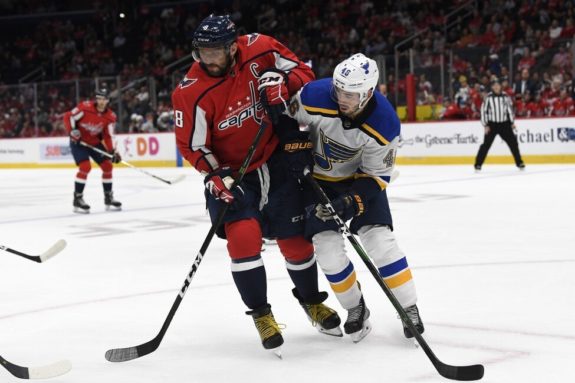
Walman performed well in the NCAA at Providence College and rose to become one of the Blues’ top defensive prospects for a period. But he’s stagnated of late, and has yet to reach the NHL, watching defensive prospects like Vince Dunn and others pass him by. If Walman is ever going to transition to the NHL, it needs to be soon, but for now, he’s disappointing the lofty expectations once set for him.
Missed Opportunity: None
Ville Husso, G (HIFK, Liiga), #94
When in doubt, draft a Finnish goaltender. That’s what the Blues did with the 94th pick, a pick they acquired from the Toronto Maple Leafs (though it was the Calgary Flames’ pick originally) in the trade that sent Roman Polak to Toronto. Husso, who had performed very well with HIFK in his draft season, had the potential to join a long line of successful Finnish NHL goaltenders.
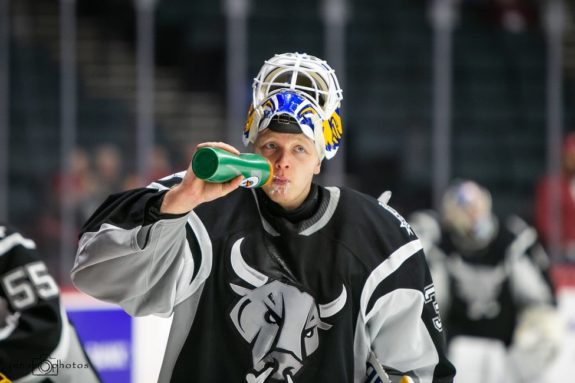
That potential has continued to blossom, and Husso remains a highly-regarded goaltending prospect. He entered the 2018-19 season as the Blues’ top prospect in that category, before the unexpected and meteoric rise of Jordan Binnington later in the season. Husso remains a much-touted prospect, though, and will look to overcome some AHL struggles going forward.
Missed Opportunity: None
Austin Poganski, RW (Tri-City Storm, USHL), #110
The Blues received this pick as part of a package when they sent B.J. Crombeen to the Tampa Bay Lightning. With it, they chose Austin Poganski, a big forward with the Tri-City Storm of the USHL, the same program from which they’d selected Jaden Schwartz in 2010. Poganski had shown some scoring skill, and at 6-foot-2 and 201 pounds, he had the size to be a threatening presence in the NHL.
Poganski has continued to develop slowly, performing well with the University of North Dakota in the NCAA, whom he captained in 2017-18. The Blues signed him to an entry-level contract after that season, and he’s played with their AHL club ever since. He likely doesn’t have the skill to be a top-end forward in the NHL, but he still has a strong chance to become a contributor in the bottom-six. He is a gritty and physical player with great character.
Missed Opportunity: Viktor Arvidsson, #112
It always hurts when you miss by two picks on a future 30-goal scorer. It hurts even more when the team that picks him is a division rival. But the pain is exponential when that rival chooses that player with a pick you surrendered to him. Such was the case when the Nashville Predators selected Viktor Arvidsson two picks after the Blues chose Poganski.
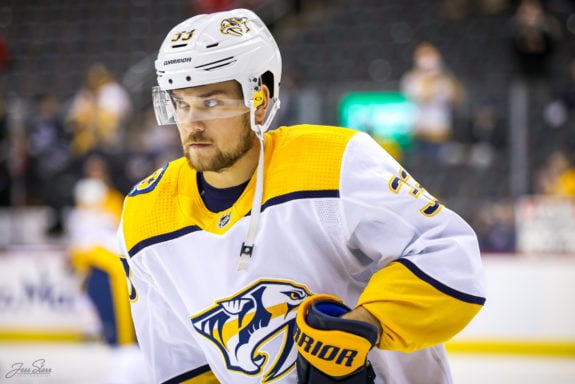
Arvidsson has developed into a perennial 60-point player, and is one of the many dangerous forwards in the Predators’ arsenal. The pick became property of the Predators the previous year when the Blues had traded up to draft St. Louis native Zach Pochiro. A series of unfortunate events makes this miss particularly bitter: neither Pochiro nor Poganski has yet developed into an NHL player. The Blues still had an opportunity to draft Arvidsson two picks earlier, and the team that picked Arvidsson was a division rival. That’s a tough loss for St. Louis that sours an otherwise great draft.
Late Rounds (5-7)
Jaedon Descheneau, RW (Kootenay Ice, WHL), #124
The Blues acquired this draft pick in the trade that sent Kris Russell to Calgary almost a year earlier, and used it to draft Jaedon Descheneau, an undersized but high-scoring winger out of the WHL. He had scored 98 points in 70 regular season games with the Kootenay Ice in his draft season, and added 20 more points in 13 games in the playoffs.
Descheneau has made a pretty successful career for himself, though he never made it to the NHL. After four seasons with the Ice (the last of which was almost entirely lost due to injury), he moved to the AHL with the Bakersfield Condors before taking his career to Europe. He’s been a point-per-game player at various stops around Europe.
The Blues’ own fifth-round pick went to Tampa Bay in the Crombeen trade, and ultimately became property of the New York Rangers. With it, they selected Tyler Nanne, a defenseman who hasn’t made it to the NHL.
Missed Opportunity: None
C. J. Yakimowicz, RW (London Knights, OHL), #172
With their sixth-round selection, the Blues chose C.J. Yakimowicz, a big, American winger playing with the London Knights in the OHL. The Blues doubtlessly liked his size, at 6-foot-2 and 209 pounds and took a chance on his development. He never became an NHL caliber player and has played most recently in the Canadian university system.
Missed Opportunity: None
Samuel Blais, LW (Victoriaville Tigres, QMJHL), #176
The Blues acquired an additional sixth-round pick in a trade with the Bruins and used it to select Samuel Blais, a small but skillful winger from the QMJHL. When the Blues drafted Blais, he stood just 5-foot-9 and weighed 165 pounds. St. Louis believed he had the skill to overcome that size.
What they could not have know at the time was that Blais had a lot of growing left to do. He is now 6-foot-2 and 205 pounds and, as a result of his growth spurt, is one of the better prospects in the Blues system. He’s shown terrific skill in bursts, including a beautiful shootout winner he scored against the Bruins.
Time will tell exactly what Blais’ NHL future will be, but any sixth-round pick that makes an impact at the NHL level has to be viewed as a huge success. The Blues got a bit lucky here, but Blais remains one of the best value picks of Armstrong’s tenure.
Missed Opportunity: None
Dwyer Tschantz, RW (Indiana Ice, USHL), #202
With their final selection, the Blues chose Dwyer Tschantz, a winger out of the USHL. Though he went on to play with Cornell, like many seventh-round picks, Tschantz never got a chance to play in the NHL. It’s a shame, as Blues fans were deprived of the opportunity to try and keep Tschantz, Schwartz, Jordan Schmaltz and Brayden Schenn straight.
Missed Opportunity: Ondrej Kase, #205
It’s hard to fault anyone for missing a player late in the fifth round, but Ondrej Kase, who was chosen three picks after Tschantz, has become a solid NHL contributor. He scored 20 goals with the Ducks in the 2017-18 season, and looked well on his way to doing so again the following season, before missing time with a serious injury.
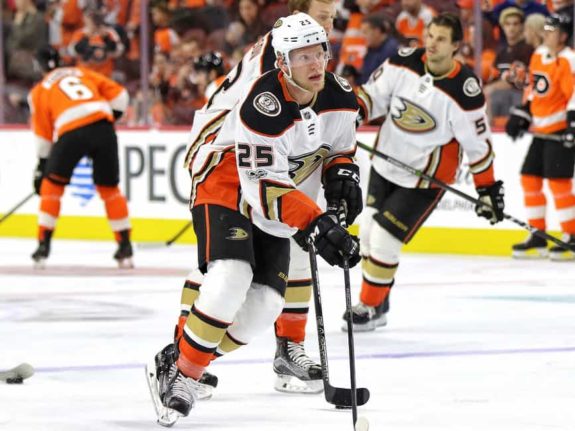
Again, the bottom of the seventh round is more luck than skill when it comes to drafting, and no one knew Kase would become a 20-goal scorer, else he would have been chosen much higher. Still, it would have been a nice grab, especially coming one round after such great success with Blais.
Final Grade: A-
2014 was certainly one of the better drafts on Armstrong’s resume. He hit with his first two picks, drafted a strong goaltending prospect and even found a diamond in the rough in the last two rounds. Had he made more out of his the additional second-round pick, this would be an A-plus.
The Arvidsson miss hurts, especially given that it was their own pick, but it’s not enough to sour such a successful draft. And Armstrong cannot be blamed for the injuries that occurred to Fabbri. Hopefully, he’ll be able to rehabilitate and reach his ceiling, even if it happens a few years later than the Blues had hoped.
Poganski, Walman, Husso and to a lesser extent Blais remain the unknowns that could make this draft a massive success. If even one of those players become a significant NHL contributor, this will be a draft to remember for some years to come. Even without knowing what those players will be, though, we can call the 2014 Draft an unqualified success for the Blues.